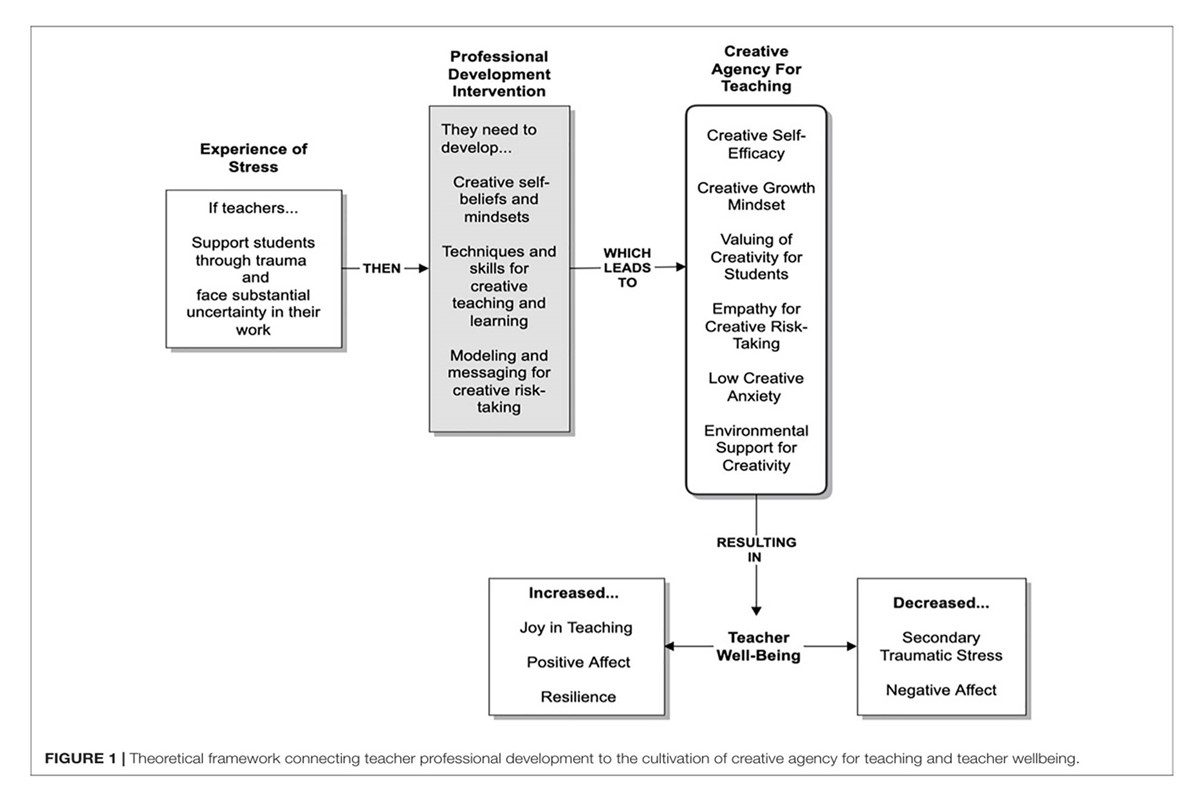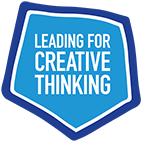Reinvigorating teachers through professional learning for creativity
Reinvigorating the desire to teach: Teacher professional development for creativity, agency, stress reduction, and wellbeing
Anderson, R., Katz-Buonincontro, J., Livie, M., Land, J., Beard, N., Bousselot, T. & Schuhe, G. (2022). Reinvigorating the desire to teach: Teacher professional development for creativity, agency, stress reduction, and wellbeing. Frontiers in Education, 7, 1-16.
Read the whole article here.
Summary
Research suggests that teachers' creative development may lead to more resilience and joy and less stress, but these connections have received little attention. This study explores the effectiveness of a hybrid professional development model focused on teachers' creative agency during the COVID-19 pandemic, a period of intensified stress, anxiety, and disconnect. Results indicated the experience of professional learning (PD) supported an increase in teachers' creative agency, empathy, joy and buoyancy. The evidence suggests teachers' creative agency and wellbeing can develop through a complementary process, rooted in creativity.
Teachers often experience stress in their professional life. Indeed the challenges of recruiting and retaining teachers across the world might suggest that there is a problem of burnout globally within the teaching profession. But what if certain kinds of professional learning focusing on creativity could alleviate such negative factors? This is the question explored in this research.

Using the theoretical framework in Figure 1, the research team hypothesised that a certain kind of professional learning might lead to greater creative agency for teaching resulting in increased joy, positive affect and resilience and that this, in turn, might help to counteract the effects of stress.
The research questions underpinning the study had a specific focus on the stress of COVID. But if made less COVID-specific they included:
- To what extent did teachers’ creative mindset, self-efficacy, empathy, and anxiety change before and after the PD experience?
- How do teachers describe the effect of the PD experience on preparing them to deal with stress?
- How do teachers describe their creative strengths as teachers?
In the study teachers participated in some 18 hours of online PD involving interactive instructional packages with video, narrated slideshows, pop-up interactives, creative exercises, reflective processes, and brief creative assignments. The course was designed to support teachers with useful mental models, language, examples, and routines for exploring the creative process in teaching and learning. For instance, teachers explored their own personal creative resources - creative attitudes, creative thinking, and creative behaviours, responding to the question - How am I creative? They took part in a survey before and after their PD to understand the attitudes they held before the intervention and establish whether there was any change to these afterwards.
Overall, results mostly supported the assumptions underpinning the theoretical framework linking reduced stress and enhanced wellbeing with increased creative agency as a result of the PD. No change from pre- to post-survey was detected in general positive or negative affect and creative anxiety. Change was detected in all other aspects of creative agency and wellbeing. 51 out of 53 teachers responded with positive reflections about how the PD experience enhanced their capacity to manage the challenges of the pandemic.
More specific findings included:
- Learning from mistakes and being “open to try new things” was mentioned as a way to take risks and grow, a foundation of teacher creativity.
- Making stronger connections to students was also central with many teachers indicating that the combination of transforming their curriculum and building better relationships with students reinvigorated their teaching practice.
- Different teachers emphasized different benefits; some focused on their own creative development and others reflected on reduced stress and enhanced enjoyment or the benefit of creative learning for their students.
- In response to the question, “What do you feel are your greatest creative strengths as a teacher?” teachers discussed several topics such as their own creative self-efficacy, creative growth mindset, the value of creativity, shaping an environment for supporting creativity, and actively using empathy with others.
Overall results demonstrated that an online PD experience can support the development of teachers’ creative agency in the classroom, replicating some of the results from an earlier pre-pandemic study.
Reflecting together
1. Do the assumptions in the theoretical framework, Figure 1 - that PD rooted in creativity can improve teachers’ creative agency and enhance their wellbeing - resonate with you?
2. How would you answer the question “What do you feel are your greatest creative strengths as a teacher?”
3. After reading the article in full, which aspects of the PD do you think might have been most important in building teacher wellbeing?
